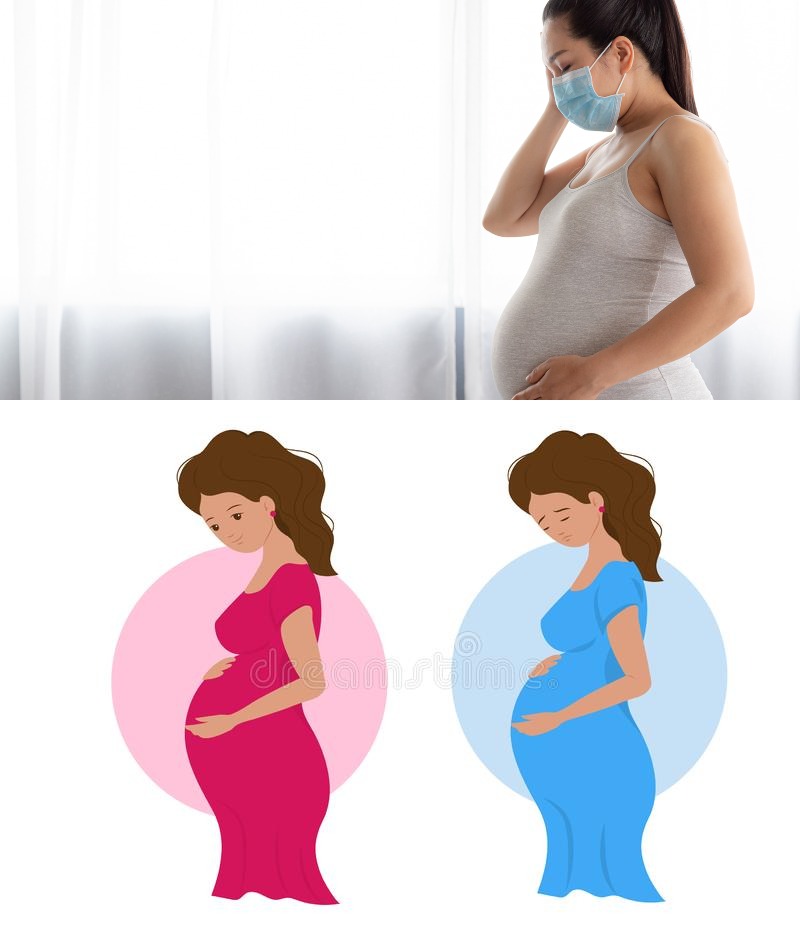December 02, 2020
Sometimes it is difficult to interpret the signals your body is sending to you. If you think you are having the first signs of pregnancy, you probably want to make sure. We list some of the early signs of pregnancy here, but keep in mind that you might not notice them all. If you are wondering if you are pregnant, a home pregnancy test or your healthcare professional can confirm this.

First signs of pregnancy
Every pregnancy is unique, but there are some signs of pregnancy that you may notice before you even know you haven't had your period. Among these first signs, we find for example:
-
The late period. One of the very first signs of pregnancy is a late period. However, if your menstrual cycle is irregular, this sign may not be very reliable.
-
Implantation bleeding. The appearance of small blood spots can be an early sign of pregnancy as it could be implantation bleeding . This phenomenon occurs when the fertilized egg clings to the uterine wall.
-
Cramps. Some expectant mothers have mild uterine cramps during the first trimester. To relieve your lower abdomen, place a hot water bottle wrapped in a towel over your stomach, or take a warm bath.
-
The feeling of warmth. High pregnancy hormone levels and increased metabolism can lead to an increase in your body temperature, making you feel a little warmer than usual. Your body compensates for this by sweating more to cool you off.
-
The heart that beats faster. Hormonal changes can also cause heart palpitations, but if these last longer than a few seconds or occur frequently, contact your healthcare professional and ask for a consultation to make sure everything is okay.
-
Mood swings. Finding out about your pregnancy is a big step, and it is normal for you to feel joy, excitement, anxiety, and confusion. Talking to your loved ones about your feelings can do you good.
-
Bloating and constipation. Your digestive system gradually slows down, and you may feel bloated (much like when your period started) and constipated. Eat foods high in fiber, drink plenty of water and, if possible, get some exercise every day.
-
Heartburn. They occur because during pregnancy, the muscles that prevent digestive acids from going back up into the esophagus tend to relax. Eat lighter but more frequently and avoid fried foods, citrus fruits, chocolate and spicy foods; this should help prevent heartburn.
-
Acne. Overproduction of sebum (oil) in the skin can cause pimples to appear during pregnancy. Gently cleanse your skin every day, do not use oily cosmetics, and ask your healthcare professional about suitable acne remedies.
-
Dizziness. Low blood sugar, stress, and fatigue can make you feel dizzy or faint. Eat light but regularly, and try not to stress too much.
-
Weight gain. Some women can gain between 0.5 and 2 kg in the first few months of pregnancy, but your doctor will be able to give you individual advice on how to gain healthy weight during your pregnancy .
-
Stuffy nose. At the start of pregnancy, the mucous membranes in your nose swell, dry out, and bleed easily. To unclog it, you can try using a humidifier or saline drops. Also remember to hydrate yourself well.
-
Headaches. Headaches can be one of the first signs of pregnancy when your estrogen levels increase. You may also have tension headaches, which can be triggered by stress or fatigue. Check with your healthcare professional to find out which medications you can take; for most pregnant women, acetaminophen (paracetamol) can be used without problem to treat occasional headaches.
-
Frequent urination. If you need to urinate more often than usual, it may mean that you are pregnant. This is because your kidneys filter more fluids, which end up in your bladder. Always drink as much water, however, as it is very important to stay hydrated.
-
Swollen and tender breasts. Your breasts may swell early on and appear more sensitive to you, but the discomfort will surely diminish as your body adjusts to the hormonal changes.
-
Morning sickness. They are a classic pregnancy symptom that usually appears about a month after becoming pregnant. For some women, morning sickness doesn't just happen in the morning, but also at other times of the day, while other women never do. Eat something before getting out of bed, and then eat small meals regularly throughout the day to keep your blood sugar level stable.
-
Food cravings, disgust and sensitivity to odors. Among the first signs of pregnancy are changes in tastes, smells and cravings. Maintain a balanced diet and consult your doctor if you crave inedible products (eg chalk or earth)
-
Tiredness. It is quite normal for you to be tired during your pregnancy, especially at the beginning. Your body is working hard to support your baby, so give yourself enough rest and relax.
-
Skin changes. You may notice that the pigmentation of your skin changes, such as the skin around your nipples darkening, dark spots appearing on your face, or a dark line appearing between your belly button and pubic area.

Do all women have pregnancy symptoms from the first few days?
Every mother-to-be is unique, and so is every pregnancy. Therefore, you may only see a few of these early signs of pregnancy. For example, you may see some pregnancy symptoms appear before you even notice a delay in your period. Conversely, maybe not having a period will be the first sign that you are pregnant. Also, the symptoms you will notice during a second pregnancy may be different from those you noticed the first time.
If you think you are pregnant, a pregnancy test will tell you. If you have some of the first signs of pregnancy but the test result is negative, that does not mean you are not pregnant. Wait a week, then retest. If the test result is positive, make an appointment with your healthcare professional to confirm that you are pregnant. You can also use our pregnancy calculator to find out how many weeks you are pregnant.
Once your pregnancy is confirmed, check out our guide . This contains all the important information you will need during your pregnancy, including infographics, checklists, monitoring charts and more!
What you may also feel during your pregnancy
Throughout your pregnancy, your body will be doing weird and wonderful things. Some of these physical changes (such as morning sickness) may improve, while others (such as a stuffy nose or heartburn) may continue until the end of your pregnancy. Here are some of the changes you might experience during the second and third trimester:
-
Losses. A sticky, clear or white vaginal discharge is normal during pregnancy, but contact your doctor if it becomes very smelly or is accompanied by pain or itching in the vagina.
-
Cramps or pain in the lower abdomen. Later in pregnancy, you may experience cramps caused by pain in the round ligament or Braxton-Hicks contractions (or false contractions) .
-
Pain in the back. Back pain can be the result of hormonal changes, weight gain, or changes in your posture due to your belly growing. Practice proper posture, sleep on your side, and exercise daily to help relieve pain.
-
Frequent urination. The more frequent urge to urinate that you may have had at the start of your pregnancy has probably gone away during the second trimester, but it can return during the third trimester. This is related to your baby's descent lower into the pelvis, which puts pressure on your bladder and may make you want to pee more often.
-
Itchy skin. Anywhere your skin stretches during pregnancy (eg stomach and thighs), you may feel itchy. Avoid scratching, use a good moisturizer, and shower or bathe in lukewarm water, as hot water can dry out your skin.
-
Stretch marks. During your pregnancy, your skin stretches and you may notice the appearance of stretch marks especially on your stomach, thighs, buttocks and breasts. Measured and spread weight gain throughout your pregnancy can help minimize these streaks.
-
Shortness of breath . As your baby grows, your lungs will compress, which may make you feel like you are short of breath. Good posture can give your lungs more room to inflate.
-
Various pains . You may experience different symptoms at different times during your pregnancy, such as sore or tender teeth, varicose veins or hemorrhoids, swollen ankles, or leg cramps. Learn about these aches and pains and get tips here.
Most of the time, these physical discomforts and changes are completely normal, but there are some signs that you should not ignore such as severe headaches, visual disturbances or spontaneous swelling (edema). If you notice anything that seems abnormal to you, see your healthcare professional.
These daily signs of pregnancy can be exhausting, but in no time, it will be delivery and you will be bringing your baby home. Having had to endure these pesky pregnancy symptoms will have been worth it! Check out our pregnancy calendar for a more detailed description of what happens each week, month and trimester. You are embarking on a wonderful adventure, enjoy the journey.
Posted by: pregnancyunited at
08:02 PM
| No Comments
| Add Comment
Post contains 1523 words, total size 11 kb.
29 queries taking 0.0152 seconds, 38 records returned.
Powered by Minx 1.1.6c-pink.









